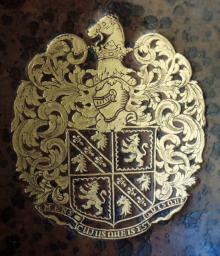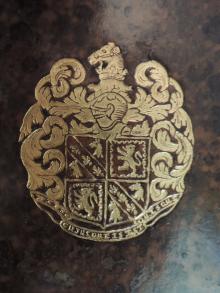Pepys, Samuel (1633 -1703)
Samuel Pepys, the diarist, was the son of John Pepys of Cottenham in Cambridgeshire, and descended from the John Pepys who married Elizabeth Talbot, the heiress of Cottenham. He was educated at Huntingdon, St Paul's School, and Trinity Hall 1650, transferring to Magdalene College, Cambridge early the next year, where he took his B.A. in 1653, and his M.A. in 1660. On 1 December 1655, he married Elizabeth, daughter of Alexandre St Michel, a Huguenot. In 1656, he entered the family of his father's first cousin, Sir Edward Montagu, and accompanied him on his expedition to the Sound. On his return he became Clerk in the office of Sir George Downing, one of the tellers of the Exchequer, and in 1660 he was made Clerk of the Acts of the Navy. In 1673 he became Secretary to the Admiralty, an office which he held until 1679. In 1673, also, he was elected Member of Parliament for Castle Rising, and sat for Harwich, in 1679. He was accused of treason and imprisoned in the Tower 22 May 1679, but was released the following year when one of his accusers confessed that it was a trumped up charge. In 1684 he was President of the Royal Society, and in the same year, Pepys was again appointed Secretary to the Admiralty. In May 1685 he was again Member of Parliament for Harwich, and also held the post of Secretary until 20 February 1689. On 9 March following he was instructed to hand over his papers to Phineas Bowles, who succeeded him. After his retirement he lived mostly at Clapham with William Hewer, who had been his clerk. He left his estate to his nephew, John Jackson, son of his sister Paulina, leaving him his library for life. It was afterwards to go to some college, Magdalene College, Cambridge for preference, and to be kept separate, with various restrictions on its use. Upon Jackson's death in 1726, it was accordingly given to Magdalene, where it is placed in a building to which Pepys had subscribed, and is kept in the original cases he had made for it. There are also fifty volumes of Pepys Manuscripts in the Rawlinson Collection in the Bodleian Library, Oxford.




